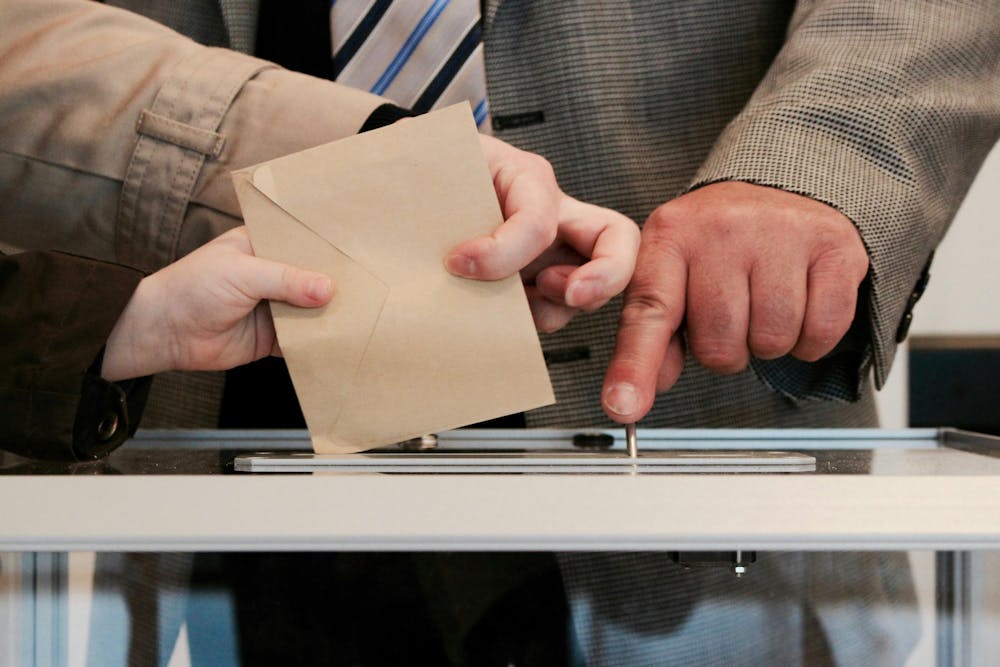For most Notre Dame students, the upcoming election this Tuesday, Nov. 5 will be the first presidential election they are eligible to vote in.
Johnson Family Hall freshman Maisy Adams expressed her excitement to be a voter. She registered online this past April, voted for the first time in the primaries at her local polling place this summer and voted early in the general election when she was home in Ohio for fall break.
Flaherty freshman Grace Fuchs also registered this past spring.
“They had a person come and give us cards at school, and then they sent us our registration months later. It was a bit confusing since there was no confirmation they received anything until I got the voter ID card. Plus, some of my friends had the cards come with misspelled names and had to reapply,” she said.
Overall, however, Fuchs believes preregistration and early voting are easily accessible and important processes. Like Adams, she voted in the primaries and in person for the general election over break.
For students from swing states — Michigan, Pennsylvania and Wisconsin being the most notable in this election — voting comes with a heightened sense of importance as the election will most likely come down to close margins in their states.
“I feel like my vote is super important … every vote obviously counts, but when you’re voting in a swing state your vote really has the potential to make a big difference in the election,” Sarah Ramsden, a Pasquerilla West freshman from Beloit, Wisconsin, said.
Jack Regan, a Keough freshman from Ann Arbor, Michigan, and Iyabo Ojulari, a Welsh Family Hall sophomore from Philadelphia, Pennsylvania, echoed this statement. Fuchs, who is from St. Louis, Missouri, offered a different perspective.
“I think my vote will likely not count. I voted mostly blue in a very red state, but you cannot always predict how people will vote,” Fuchs said. “Even if my vote may not matter, by choosing not to vote I potentially give more power to a vote I disagree with and enable it to make up a larger amount of the percentage of voting.”
Fuchs continued on voting's importance.
“It’s important to always vote to see what happens and at least know you did your civic duty. If you choose to not vote and then complain about the outcome or politics, I think you did it to yourself, and you have no place to stand,” Fuchs said.
None of those voting in the swing states had an idea as to what the election results would be in their state. Instead, they pointed to the diversity of messages they received in their areas.
Ramsden explained the bigger cities in Wisconsin lean left, but other areas lean right.
“Especially where I’m from, there’s a mix. You drive around Beloit, and you see Trump signs in one yard and Harris signs in the next yard,” Ramsden said.
Ojulari noted, in Philadelphia, she has noticed more affluent areas have more yard signs for Republicans while in the other parts, there are generally more signs for Democrats. Regan shared his area of Michigan is very liberal.
“Basically everyone has a Harris sign outside their house, and if you are Republican, people aren’t really loud about it,” Regan said.
He did, however, notice a lot more political ads for both candidates when he went back to Michigan for fall break.
“If you live in a swing state, you get bombarded by ads from both sides. Our television ads are heavily targeted — every ad is for the right or the left, they’re all over the place,” Ojulari said. “The mail you get is from both sides, and people show up at your door a lot, because it could go either way.”
As for the key issues in her state, Ojulari believes rural voters on the Appalachian side of Pennsylvania are most motivated by concerns over the coal industry. This makes them more likely to vote for Republicans as their policies lean towards letting businesses operate despite environmental concerns. Near Philadelphia, she believes voters are more motivated by social issues such as homelessness and poverty, leading them towards Democratic candidates.
Ramsden has noticed the economy, abortion and foreign policy influence the people she is surrounded by in Wisconsin.
Voters consider the issues important to them in different ways, approaching voting differently when they hit the ballot box. Adams elected to vote primarily straight-ticket as she found the candidates from one particular party took the right stances on the issues she cares about most.
Fuchs decided to approach the election person-by-person. She used resources from the League of Women Voters and Ballotpedia, as well as examined politicians' voting records and policy history, to make her decisions. For judges, she looked at their evaluations.
“No one seems to fully like either outcome, which is very disappointing to see,” Fuchs said. “It seems that neither candidate represents America to the fullest, and it is sad that our politics has made it hard to have two candidates that are the best America has to offer.”










